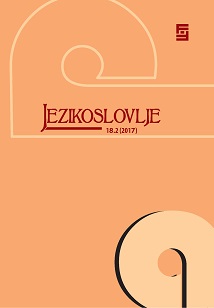Leksikografska obrada frazema s promjenjivom glagolskom sastavnicom u hrvatskome
The lexicographic treatment of Croatian idioms with a variable verb
Author(s): Ivana Filipović Petrović, Jelena ParizoskaSubject(s): Language studies, Language and Literature Studies, Applied Linguistics, Lexis, Computational linguistics, South Slavic Languages
Published by: Filozofski fakultet, Sveučilište Josipa Jurja Strossmayera, Osijek
Keywords: idioms; variation; dictionaries; corpus; Croatian
Summary/Abstract: Corpus studies show that in some languages, English being a case in point, verbal idioms exhibit the greatest degree of variation, with the verb being the most variable component. Unsurprisingly, monolingual dictionaries of English and other languages tend to list verb substitutions. Croatian dictionaries adopt the same practice with variable consistency: they list all the lexical variants in certain entries, and only some variants in others. In the latter case, abbreviations such as i sl. ‘and similar’ and itd. ‘etc.’ are used. Moreover, in cases where verb variability is indicated in the entry, no illustrations of the use of the other verbs are provided. All this may present difficulties for users, with the use of itd. ‘etc.’ being particularly problematic, because it signals that the variable verb may be replaced by (presumably any) semantically unrelated verb. The conventionality/innovativeness of idiom variants may also present a problem for dictionary users, because the dictionaries are not consistent in providing examples of use, or indicating creative uses.The aim of this paper is to show that the number of verb substitutions in idioms is limited, which is not signalled by abbreviations such as i sl. ‘and similar’. Furthermore, we will show that the choice of verb substitutions is not completely free, but depends on conceptual motivation, which has important consequences for their lexicographic treatment. We extracted 187 verbal idioms containing the abbreviations i sl. and itd. from the Croatian Dictionary of Idioms (2014) and tested their use in the hrWaC corpus. The results show that there are significant differences between variant forms in frequency and use, and that some idioms occur in forms and meanings which are not listed in the dictionary. Based on this, we argue that conventionalized lexical variants should be listed in the dictionary to enhance users’ idiom comprehension and confidence of use. Based on our data and current lexicographic practice in other languages, we propose several possibilities of treating idioms with variable verbal components in monolingual dictionaries of Croatian.
Journal: Jezikoslovlje
- Issue Year: XVIII/2017
- Issue No: 2
- Page Range: 245-278
- Page Count: 34
- Language: Croatian

